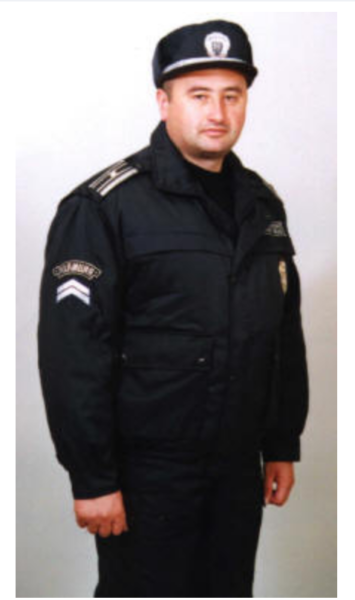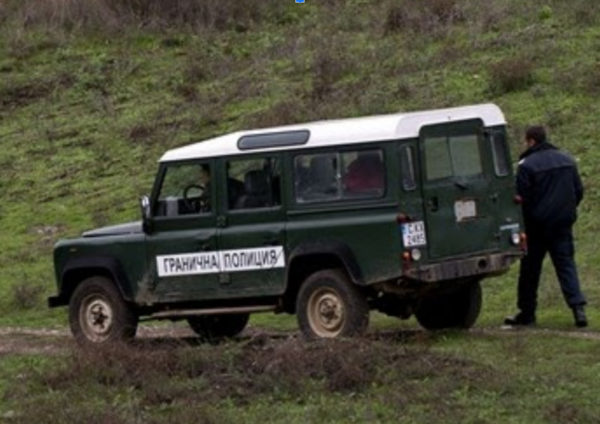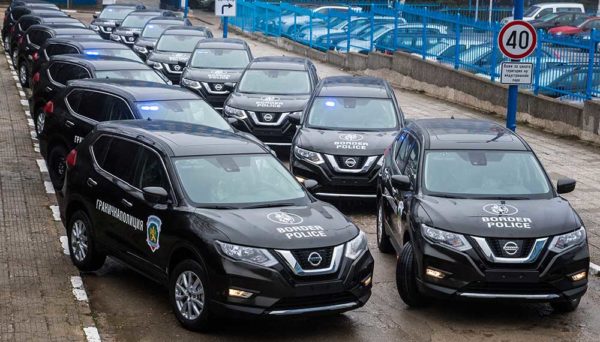“We spent 10 days walking in the snow and the cold weather while being hungry - then they pushed us back in one hour.”
| 03.11.2022 | Valcha Polyana to Hamzabeyli | josoor | 41.9761861, 26.660515 | Bulgaria | Turkey | no | no | yes | no | no | no | 29 - 30 | 2 | Morocco, Tunisia | 9 | beating (with batons/hands/other), kicking, theft of personal belongings, reckless driving | 2 men in civilian clothing; 1 grey Fiat Doblo; 3 men in black jackets with four pockets on the front, an insignia of a lion on the left sleeve, and ranks on their shoulder as well as black pants and black boots; 1 green jeep with a white stripe and Bulgarian writing on the side; 4 men in sacramento green jackets and pants with “border police” written on their backs and a crest with a lion and a Bulgarian flag on their sleeves; 1 black Nissan X-Trail with “border police” written on the hood in white |
The respondent, a 29-year-old Tunisian man, was pushed back from Valcha Polyana, Bulgaria to Hamzabeyli, Turkey at around 10 a.m. on March 11th, 2022. He had previously been pushed back from Greece twice and from Bulgaria at least four times. According to the respondent, at 11 a.m. on March 1st, 2022, he and his friend, a 30-year-old Moroccan man, took a bus from Edirne to Lalapaşa. From there, they reportedly walked for about four hours along unpaved roads and wooded areas until they arrived at the Turkish-Bulgarian border fence at around three or four in the afternoon and crossed over. The respondent reported that the fence was about five meters high and had barbed wire on the Turkish side; he also recalled seeing an unpaved road along the Bulgarian side. Once they were on Bulgarian soil, they began walking in the direction of Sofia. The respondent recalled, “We walked most of it by night but sometimes we walked during the day if it was forest. And we did rest sometimes. We would sleep in the forest or some spot of course far from the village and cities. And we would rest for 20 minutes to eat or drink or smoke.” According to the respondent, they walked for 10 days. The transit group had only 20 euros and had brought enough food with them to last them a while, but they eventually ran out. On March 11th, at around 8 a.m, they reportedly stopped in the outskirts of Sliven to buy more food. The respondent recounted:
“We were so hungry and we were out of food already—we hadn’t eaten for seven hours. We had no choice but to go to the store that appeared on the map near Sliven and buy some food and then continue on our way. We wore clean clothes and went to the grocery store and we bought stuff from it. After we left, we got about 500 meters from the grocery store when two men [dressed in civilian clothes] told us to stop. I stopped in my tracks but my friend ran away. One [of the men] stayed with me and the other ran behind my friend. There were citizens sitting who also tried to catch my friend, which they did until the man in civilian clothes got him.”The two men asked the respondent and his friend for papers, recalled the respondent. When the transit group told the two men that they were refugees, they were asked where they were from; one of the men then spoke to someone on the phone. When asked to describe what happened after the two men apprehended them, the respondent recounted:
“They punched me in my face and kept slapping and kicking my friend until they put us together. Then they handcuffed us and loaded us into the backseat of the Fiat car.”According to the respondent, they drove along a paved road through the city for around 30 minutes until they arrived at a spot on the outskirts where three men wearing uniforms were waiting for them; they wore black jackets with four pockets on the front, an insignia of a lion on the left sleeve, and ranks on their shoulder as well as black pants and black boots (Image 1). They were reportedly driving a green jeep with a white stripe and Bulgarian writing on the side (Image 2). The respondent identified the uniforms and jeep from the following pictures.
 Image 1: Bulgarian National Police Uniform
Image 1: Bulgarian National Police Uniform
 Image 2: Bulgarian Police Jeep
According to the respondent, the two men in civilian clothing that had initially apprehended them then removed the handcuffs from the respondent and his friend, took their bag from them (which contained the food they had just bought), put them into the trunk of the jeep, and left.
When asked if they had asked for asylum in Bulgaria, the respondent responded:
Image 2: Bulgarian Police Jeep
According to the respondent, the two men in civilian clothing that had initially apprehended them then removed the handcuffs from the respondent and his friend, took their bag from them (which contained the food they had just bought), put them into the trunk of the jeep, and left.
When asked if they had asked for asylum in Bulgaria, the respondent responded:
“We did when the men wearing black uniforms asked us ‘Where do you want to go?’ We said ‘France asylum Bulgaria asylum’ to make him take pity on us and take us to the camp…the officer wearing green uniforms similar to Bulgarian border police said ‘Europe is not good. Go back to Turkey.’ And the men wearing black uniforms said nothing but just kicked me.”The remaining three uniformed men subsequently got into the green jeep and drove fast for around 45 minutes along paved roads, recalled the respondent. He stated, “[we] saw paved roads all the way until we arrived at a sign that had Elhovo written on it. But the car didn’t go into the city—they drove to an unpaved road inside the forest near Elhovo.” The respondent and his friend were then taken out of the trunk and told to sit on the ground and beaten, “[an officer] kicked me on my face—I was lucky to cover it with my hand. Then all of them started kicking us and slapping us.” This went on for what felt like 15 to 20 minutes to the respondent. At that point a black car arrived at the scene. When asked to descrobed the vehicle the respondent said it was a Nissan X-Trail with “border police” written on the hood in white and a license plate number that said “BG”. It also had Bulgarian writing on its side and an official crest that was green with a yellow lion inside of it. The respondent identified it from the picture below (Image 3).
 Image 3: Black Nissan X-Trail Bulgarian Border Police cars
According to the respondent, inside the car were four uniformed men dressed in sacramento green jackets and pants with “border police” written on their backs and a crest with a lion and a Bulgarian flag on their sleeves. The reportedly spoke Bulgarian to each other and a little bit of English to the respondent and his friend.
The transit group were subsequently loaded into the trunk of the Nissan X-Trail; the respondent recalled that they could barely sit in it because it was so small. He said, “We were exhausted and hungry and thirsty and beaten…we spent 10 days walking in the snow and the cold weather while being hungry then they pushed us back in one hour.”
They were reportedly driven in a fast manner for about another 40 minutes. According to the respondent, the windows were blocked so that the transit group couldn’t see outside until they stopped and got out of the car in a forest, where all they could see was the border fence, wind turbines on the Turkish side, and an unpaved road. The four men in uniform then asked the group where they were from and where they crossed from. They searched the group and took their jackets, shoes and phones taken; they also beat them for about five minutes each, focusing their blows on the men’s calves and thighs, recounted the respondent.
After the beating they opened an unofficial door in the fence and pushed the two men back. Two of the uniformed men reportedly followed them into Turkish territory, hitting them with a plastic baton and telling them to run.
The respondent and his friend walked through the forest for about 40 minutes until they arrived at the village of Hamzabeyli, where an old man gave them bread and water, explained the respondent. They continued walking for another 20 minutes to the bus station, where they were able to hitch a ride back to Edirne.
Image 3: Black Nissan X-Trail Bulgarian Border Police cars
According to the respondent, inside the car were four uniformed men dressed in sacramento green jackets and pants with “border police” written on their backs and a crest with a lion and a Bulgarian flag on their sleeves. The reportedly spoke Bulgarian to each other and a little bit of English to the respondent and his friend.
The transit group were subsequently loaded into the trunk of the Nissan X-Trail; the respondent recalled that they could barely sit in it because it was so small. He said, “We were exhausted and hungry and thirsty and beaten…we spent 10 days walking in the snow and the cold weather while being hungry then they pushed us back in one hour.”
They were reportedly driven in a fast manner for about another 40 minutes. According to the respondent, the windows were blocked so that the transit group couldn’t see outside until they stopped and got out of the car in a forest, where all they could see was the border fence, wind turbines on the Turkish side, and an unpaved road. The four men in uniform then asked the group where they were from and where they crossed from. They searched the group and took their jackets, shoes and phones taken; they also beat them for about five minutes each, focusing their blows on the men’s calves and thighs, recounted the respondent.
After the beating they opened an unofficial door in the fence and pushed the two men back. Two of the uniformed men reportedly followed them into Turkish territory, hitting them with a plastic baton and telling them to run.
The respondent and his friend walked through the forest for about 40 minutes until they arrived at the village of Hamzabeyli, where an old man gave them bread and water, explained the respondent. They continued walking for another 20 minutes to the bus station, where they were able to hitch a ride back to Edirne.
